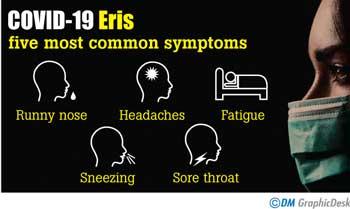Reply To:
Name - Reply Comment

By Sheain Fernandopulle
In the wake of a new variant COVID-19 dubbed ‘Eris’ spreading rapidly across the United Kingdom, triggering alarm among health officials, Sri Lankan Health authorities said they keep a close eye on the new developments of the virus and are on alert.
A descendant of Omicron, Eris, or EG.5.1, was first flagged as a variant in the UK on 31 July, but now accounts for one in 10 Covid cases.
It is now the second most prevalent variant in the UK, after Arcturus which makes up almost half of all infection cases at 39.4 per cent, according to UK Health Security Agency (UKHSA).
Speaking to Daily Mirror, Sri Lanka COVID-19 Coordinator Dr. Anwar Hamdani said the Ministry has always been on alert on any new disease spreading in a foreign country as it could pose a threat to Sri Lanka.
“As far as the virus spreading in the UK is concerned, we are vigilant and monitoring the situation,” said Dr Hamdani.
As per the latest report by the UKHSA on August 3, COVID-19 cases continue to rise across the UK.
The five most common symptoms of Eris, a strain of Omicron, are runny nose, headache, fatigue, sneezing, and sore throat, as per health experts.
It appears to be spreading quickly and could be one reason why there has been a recent rise in cases and hospitalizations.
“We continue to see a rise in COVID-19 cases in this week’s report. We have also seen a small rise in hospital admission rates in most age groups, particularly among the elderly. Overall levels of admission still remain extremely low and we are not currently seeing a similar increase in ICU admissions,” said Dr Mary Ramsay, UKHSA’s Head of Immunisation.
Officials further say they are “closely” monitoring the situation as COVID case rates continue to rise.
In this context, WHO Director-General Tedros Adhanom Ghebreyesus said though people are better protected by vaccines and prior infection, countries should not let down their guard.